My trip to the South Hills of Pittsburgh lasted the entire length of the album. From Rt. 22 East and the harmonica opening of “Thunder Road,” right down to the closing “Jungleland” howl on Mt. Lebanon Boulevard, I kept feeling like I had to pull over and talk about it to somebody, or at least scribble down my now-grown-up reactions to an album I first heard at age 15. But I was flying solo and had a date to keep. So I rode on, with eyes burning, hoping my best words and ideas would hang around in my brain till I could get home and put them all on paper.
There’s so much to say about the sound of the music on “Born to Run.” But writing about music is like dancing about architecture, someone once said. You just can’t do it justice. So, I’ll stick with the lyrics, because words are something I know a little about. In particular, I want to unravel my thoughts on the LP’s wistful opening song, named for the title of a movie Bruce had never actually seen at the time: the 1958 Robert Mitchum film “Thunder Road.”
Here are my favorite words from a song jammed full of lyrics painted in motor oil on a canvas of desperation. The boy from Freehold was giving the boy from Hibbing a run for his money with this one.
There were ghosts in the eyes
Of all the boys you sent away.
They haunt this dusty beach road
In the skeleton frames of burned out Chevrolets.
They scream your name at night in the street,
Your graduation gown lies in rags at their feet.
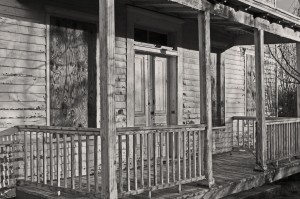 Oh, Mary with the waving dress! Only the lonely know the heartaches she’s been through. She’s on the porch of her beachfront shack-fortress, part Boo Radley, part Greta Garbo. All of them myths. Out ahead is a killer in the sun….a road that brings the greaser boys in their muscle cars to worship at her altar, night after starless night. She can hear them out in the mist, screaming her name. But when she throws open the screen door and runs outside, they’re gone in the salty wind. Could it be they only exist in her mind? Doesn’t matter. They’re not what she wants, anyway. They can’t take her any farther than the end of that dark road. So she waits, in her thin shapeless cotton dress, throwing roses in the rain, ready for a savior to rise from the streets. What are the chances of ever finding him? Slim. It’s a town full of losers, after all. But unlike all her imaginary losers, one is real, and he gives her her best and final offer: come down from your front porch, climb into my front seat, untie your hair, and let these two lanes take us away to some kind of paradise, way past the tracks. Trade in your wings for my wheels. I may not be what you want, but maybe I’m just a little bit of what you need — at least until the screen door slams and locks you in your loneliness again.
Oh, Mary with the waving dress! Only the lonely know the heartaches she’s been through. She’s on the porch of her beachfront shack-fortress, part Boo Radley, part Greta Garbo. All of them myths. Out ahead is a killer in the sun….a road that brings the greaser boys in their muscle cars to worship at her altar, night after starless night. She can hear them out in the mist, screaming her name. But when she throws open the screen door and runs outside, they’re gone in the salty wind. Could it be they only exist in her mind? Doesn’t matter. They’re not what she wants, anyway. They can’t take her any farther than the end of that dark road. So she waits, in her thin shapeless cotton dress, throwing roses in the rain, ready for a savior to rise from the streets. What are the chances of ever finding him? Slim. It’s a town full of losers, after all. But unlike all her imaginary losers, one is real, and he gives her her best and final offer: come down from your front porch, climb into my front seat, untie your hair, and let these two lanes take us away to some kind of paradise, way past the tracks. Trade in your wings for my wheels. I may not be what you want, but maybe I’m just a little bit of what you need — at least until the screen door slams and locks you in your loneliness again.
Growing up – not a beauty, but bordering on alright – there were no boys roaring away from my front porch, rejected and lovelorn, their engines blazing with anger. (I didn’t even have a porch). There were no ghosts calling my name at night. The only savior that would rise from my streets would come in the form of a round piece of vinyl on a cheap Sears record player. Like Mary, I whiled away far too many hours, hiding ‘neath my covers and studying my pain, cursing my town full of losers, feeling restless and bored and imagining that life was better someplace else. Sure, I had loving parents, decent grades, a few loyal friends, and a rock-n-roll I.V. drip by my bed. But still I longed for the day I’d shed my graduation gown at the feet of the small-town snobs and the unenlightened. Somewhere in the back of my mind I knew it was gonna be an eternity before I traded in my training-wheels for wings.
But the day would finally come when I pulled out of town – not to win, whatever that means – just to get out. I never wanted to be top of the list, king of the hill, A-number-1. I never wanted the boys or the cars. No, I wanted to find meaning and artistic expression and fulfilling work and, ultimately, self-acceptance. And eventually, in the lonely cool before or after many a dawn, I started to get a little closer to casing that promised land. It took many years of throwing roses in the mud to realize that what I thought I wanted was there all along. I walked out the back door, climbed into the front seat, and found someone already sitting there: me….with my redemption purring gently beneath the hood.
[ADDITION on August 25, 2019:]
Ah, what a lovely way to wrap things up — spinning Bruce’s song into a personal tale that encourages teenage girls to follow their dreams, embrace their own power, and accept themselves as they are.
The reality is, I’m still climbing….sometimes crawling…. into that getaway car every day — chasing a dream, looking for redemption, praying for acceptance. Finding ME.
Bruce’s working title for “Thunder Road” was “Wings for Wheels.” He originally wrote the “skeleton frames” lyric as “skeletons found by exhumed shallow graves.” Doesn’t have quite the same ring, does it? Good thing he lightened it up a bit. Now, sit back and take a journey down the two-lane with Mary and her dreamer-greaser boyfriend as they grab one last chance to make it real.
© Dana Spiardi, August 25, 2015
]]>
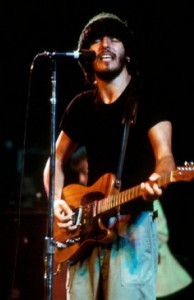 Growing up in extreme poverty may have driven James Brown to work till exhaustion, but what inspired a middle-class white boy from Long Branch, New Jersey, to rock his heart out onstage for four hours, night after night, from beach bars to coliseums? His love of his fans is one easy answer. But it goes much deeper than that, as I learned after reading a fascinating profile of Bruce in the July 2012 issue of The New Yorker magazine.
Growing up in extreme poverty may have driven James Brown to work till exhaustion, but what inspired a middle-class white boy from Long Branch, New Jersey, to rock his heart out onstage for four hours, night after night, from beach bars to coliseums? His love of his fans is one easy answer. But it goes much deeper than that, as I learned after reading a fascinating profile of Bruce in the July 2012 issue of The New Yorker magazine.
Like many artists with complicated backgrounds, Bruce has had his share of alienation, self-doubt, and can’t-please-Daddy issues. He is quoted in The New Yorker article as saying that his tireless on-stage energy was often driven by “pure fear and self-loathing and self-hatred.” Yes, folks, one of the most famous and talented men on the planet has looked deep within himself and wondered: What does it all mean? What do I do next? In a remarkable display of self-honesty, he told writer David Remnick:
“My issues weren’t as obvious as drugs. Mine were different, they were quieter—just as problematic, but quieter. With all artists, because of the undertow of history and self-loathing, there is a tremendous push toward self-obliteration that occurs onstage. It’s both things: there’s a tremendous finding of the self while also an abandonment of the self at the same time. You are free of yourself for those hours; all the voices in your head are gone. Just gone. There’s no room for them. There’s one voice, the voice you’re speaking in.”
Bruce literally wore himself out on stage. Because for those three or four hours he could use rock and roll as a great escape, and take the audience along as he went riding out to case the promised land.
Years ago when I first heard Bruce’s song “Somewhere in the Night” I latched onto a particular lyric: Turn the radio up loud, so I don’t have to think. It’s always been that way for me. Turn the volume dial up to 11 and let me rock the reality out of my head for a while. Like Bruce, I understand the therapeutic value of burying myself in music, art…and work. I write a pop culture blog that is followed by a few loyal friends and music fans. I don’t do this for money or fame. I don’t consider it a hobby; I think of it as my work. I write about the things that feed my soul, and if I happen to enlighten someone along the way, I’m happy. But, deep down, I’m truly writing to satisfy ME. Like Bruce, I’m free of myself, and living in the moment. There’s one voice: the voice I’m writing in. All the other chatter in my head is gone. I manage to silence the itty-bitty-shitty committee that says, you’re a loser….you’re a fraud….you’re lazy and self-absorbed….everyone you know is happier and more fulfilled than YOU….your friends secretly loathe you….you’re going to wither away and die in a crummy nursing home, with no one to visit you….you coulda/shoulda/woulda gone farther in life IF you’d done THIS not THAT. For most of my life I’ve been seeking ways to deal with the root causes of those inner fears, and not just bury them away. I’ve immersed myself in psychotherapy, 12-step recovery programs, hypnosis, both homeopathic and Big Pharma anti-depressant medication regiments, consultations with astrologers, tarot readers, aroma therapists, and chakra balancers, and spiritual practices galore. And it’s all helped. But, on days and nights when the voices get too loud, the only way to escape is through creative work.
Most nights I write till I’m so tired I can collapse into bed and fall fast sleep before the fear of tomorrow starts creeping into that scary neighborhood I call my brain. Some people accomplish this form of escapism with a cocktail. (Been there, done that.) Now I do it with a keyboard. Like Bruce, I immerse myself in my creative work to stay free of the bondage of self. No chemical substance on earth can chase away the demons and revitalize a paralyzed soul like experiencing music and art head-on, and spreading the gospel.
Bruce Springsteen is considered a hero of the working class. Yet, he never labored in a steel mill, coal mine, or car wash. Much of what he knew about the working life came from watching his frustrated father float from job to job: bus driver, millworker, prison guard. Bruce made his bones singing about disillusioned men who toil away at mind-numbing work — people who always seem to take one step up and two steps back. His songs can fill you with hope and wild abandon, inspiring you to head straight into the storm. Or, they can leave you wanting nothing more than to hide ‘neath your covers and study your pain.
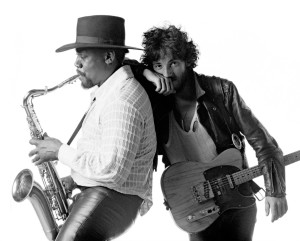
I have a long history with Bruce Springsteen. Back when I discovered him in 1975, he was still singing about boy-prophets and Tilt-a-Whirls, Southside sisters and subway sages, cool Romeos and late Juliets who sat on fire escapes and skipped school. I liked that Bruce the best, because those songs were about romantic escapism. Later, when he started singing sad ballads about cities in ruin and desperate people with dead-end lives, it was more reality than I could handle.
But whether I dig the desolate songs or not, I continue to see his shows — over 30 since 1976 — and I salute him for his seemingly innate ability to pen lyrics that strike deep chords in our collective subconscious. Whether you sit behind a mahogany desk or stand behind a jack-hammer, is there any one of you who has not related to this lyric from “The Promised Land” at one time or another in your working life?
I’ve done my best to live the right way,
I get up every morning and go to work each day.
But your eyes go blind and your blood runs cold,
Sometimes I feel so weak I just wanna explode.
Bruce is a true original. And whether or not I embrace every one of his albums is a moot point. Because, like all real artists, he follows his soul. The fact that he’s made millions from 40 years of delivering us from evil with his rock gospel revival shows hasn’t changed the fact that Bruce Springsteen will never be satisfied. He’ll keep pushing till it’s understood. And brother, that’s the story of my life.
Said Springsteen in the New Yorker article: “I’m thirty years in analysis! Look, you cannot underestimate the fine power of self-loathing in all of this.” (I feel ya, Brucie, most definitely.) “You think, I don’t like anything I’m seeing, I don’t like anything I’m doing, but I need to change myself, I need to transform myself. I do not know a single artist who does not run on that fuel. If you are extremely pleased with yourself, nobody would be fucking doing it! Brando would not have acted. Dylan wouldn’t have written ‘Like a Rolling Stone.’ James Brown wouldn’t have gone ‘Unh!’ He wouldn’t have searched that one-beat down that was so hard. That’s a motivation, that element of ‘I need to remake myself, my town, my audience’—the desire for renewal.”
Thanks, Bruce, for inspiring me to find release and renewal through the power of music, art, self-expression, and hard work.
Abandon yerselves, boys and girls!
© Dana Spiardi, September 3, 2012
]]>
Almost all of my childhood friends had dads who served in either World War II or the Korean War. In those days it wasn’t uncommon for veterans to keep their war stories to themselves, especially those who fought in battle or witnessed atrocities. The men who went to war back then were of a generation steeped, for better or worse, in silent suffering. They shared a collective stiff-upper-lip consciousness. I remember being at the home of my friends Betty Jo and Ann, building a cage in the basement for our pet mouse Harvey, when we stumbled upon a small case containing a Purple Heart – a medal awarded to those wounded or killed while serving their country. My friends were surprised to discover it, and stunned that their dad, Perry, had never mentioned he was wounded.
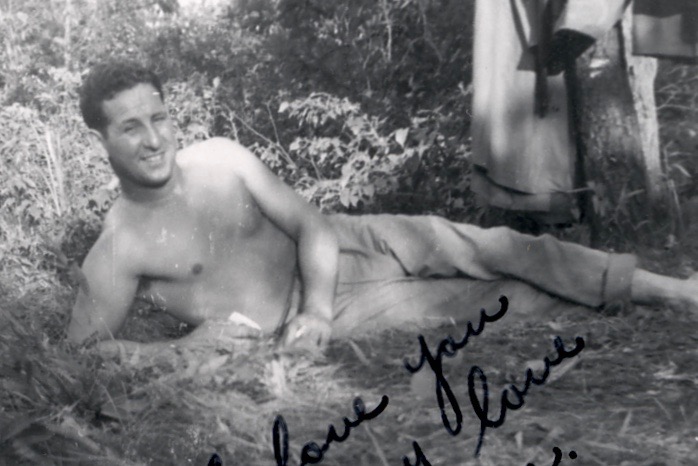 Well, my father was one of the lucky ones who returned from a foreign war with mind and body intact (albeit a somewhat exhausted liver). He was drafted to serve in the Korean War, departing from his hometown of Blairsville, PA, in December 1950. He managed to avoid serving on the front lines because he possessed a skill – auto mechanics – that landed him in the motor pool. His schooling in the world of engines, transmissions, shocks, and struts was driven more by need than a mere love of cars. To make some extra money for his family, my industrious dad asked the administrators at his school if he could leave classes a few hours early to work at Art Baker’s auto repair shop, a decades-old garage on North Walnut Street. Times were tough. My Italian immigrant grandparents raised five kids on a coal miner’s salary. They also made a little cash selling “Dago Red” wine that my grandmother Rose made in her basement. As a kid, my dad loaded the bottles into a wagon, covered the goods with a blanket, and peddled spirits through the streets of South Blairsville’s Italian neighborhood and the nearby company village known as Tin Town, on the banks of the Conemaugh River.
Well, my father was one of the lucky ones who returned from a foreign war with mind and body intact (albeit a somewhat exhausted liver). He was drafted to serve in the Korean War, departing from his hometown of Blairsville, PA, in December 1950. He managed to avoid serving on the front lines because he possessed a skill – auto mechanics – that landed him in the motor pool. His schooling in the world of engines, transmissions, shocks, and struts was driven more by need than a mere love of cars. To make some extra money for his family, my industrious dad asked the administrators at his school if he could leave classes a few hours early to work at Art Baker’s auto repair shop, a decades-old garage on North Walnut Street. Times were tough. My Italian immigrant grandparents raised five kids on a coal miner’s salary. They also made a little cash selling “Dago Red” wine that my grandmother Rose made in her basement. As a kid, my dad loaded the bottles into a wagon, covered the goods with a blanket, and peddled spirits through the streets of South Blairsville’s Italian neighborhood and the nearby company village known as Tin Town, on the banks of the Conemaugh River.
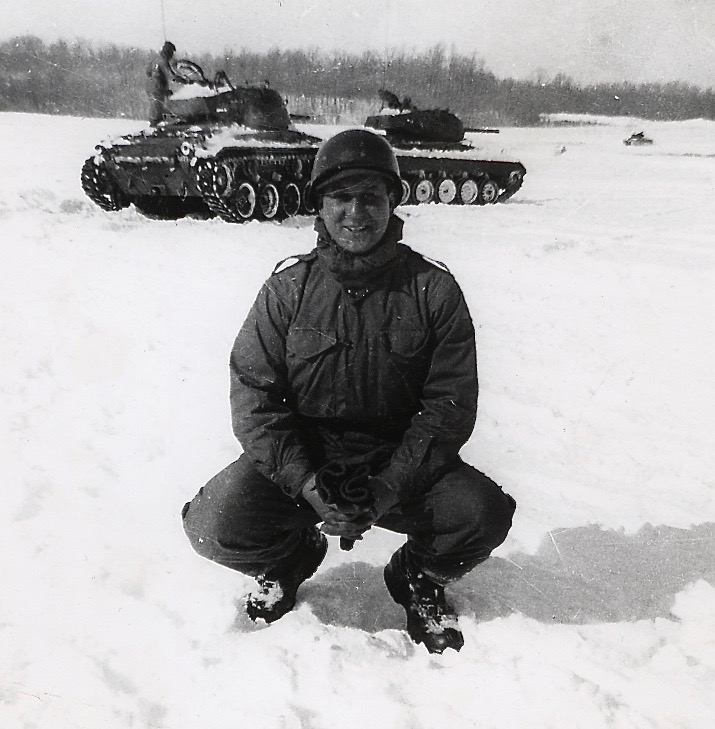 PFC Spiardi didn’t come home with any horror stories from the war — just a few tales of bad hangovers and one account that involved the time he almost lost several frostbitten toes during the brutal Korean winter of 1951. I was intrigued by his traumatized toenails. They always looked like small stalks of wilted celery.
PFC Spiardi didn’t come home with any horror stories from the war — just a few tales of bad hangovers and one account that involved the time he almost lost several frostbitten toes during the brutal Korean winter of 1951. I was intrigued by his traumatized toenails. They always looked like small stalks of wilted celery.
As a toddler he’d get my attention by calling out, idi-wa, which was Korean for “hey, come here.” And he’d beckon me to him, Asian-style, by extending his arm in an overhand fashion and wiggling his fingers forward and back.
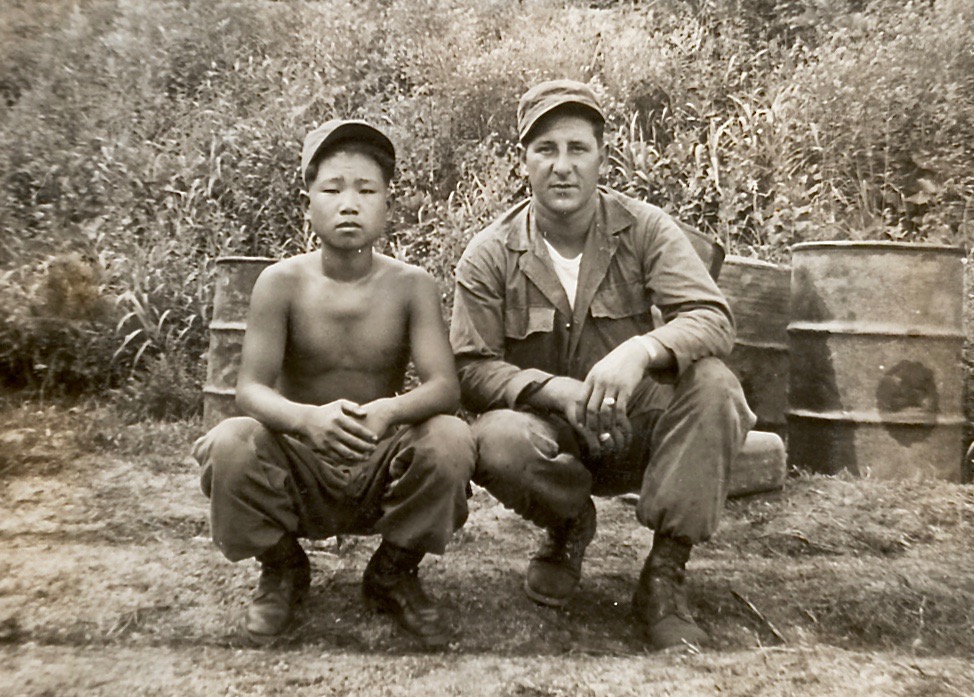 He liked to toss around a few other phrases he’d picked up from the division’s houseboy, Kim, who ran errands for the soldiers and carried out chores like doing laundry. Takusan meant “a lot” and chisai mean “small,” and that’s how the motor pool boys indicated their preferred serving sizes in the chow line. (Years later, while living in Tokyo, I discovered Daddy had actually been speaking Japanese, the language Koreans were forced to learn during Japan’s occupation of their country.)
He liked to toss around a few other phrases he’d picked up from the division’s houseboy, Kim, who ran errands for the soldiers and carried out chores like doing laundry. Takusan meant “a lot” and chisai mean “small,” and that’s how the motor pool boys indicated their preferred serving sizes in the chow line. (Years later, while living in Tokyo, I discovered Daddy had actually been speaking Japanese, the language Koreans were forced to learn during Japan’s occupation of their country.)
Being in the motor pool provided a soldier marooned in the Korean countryside with numerous opportunities, one of which involved the chance to temporarily escape the grim surroundings by driving a company jeep to and from Seoul to transport people and assorted goods. Daddy was not only an imbiber of alcohol, but an enterprising one, at that. During his brief stop-overs in the capital city, he’d buy a few bottles of choice liquor, take it back to camp, and make a profit selling it to his buddies.
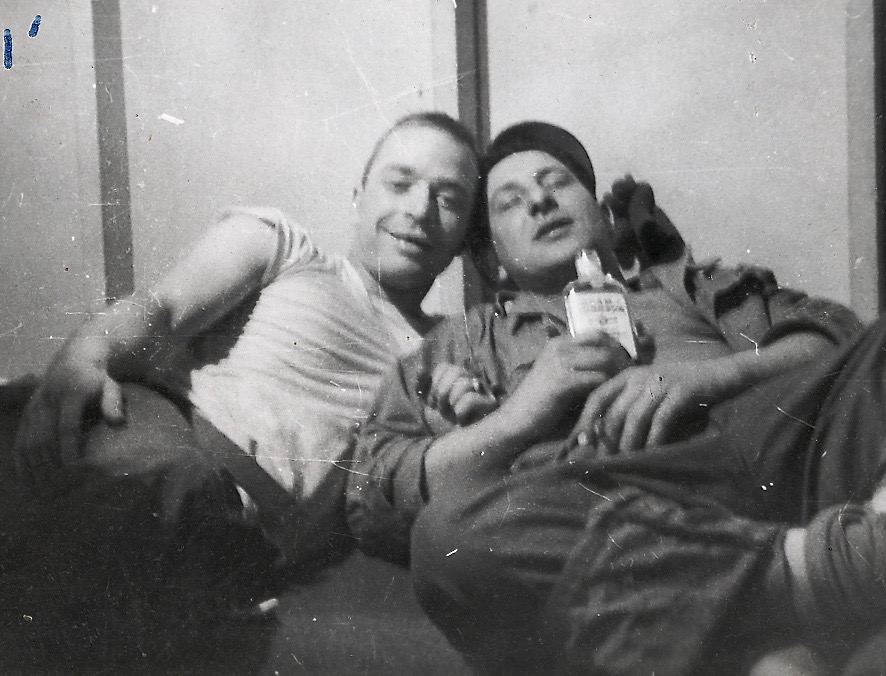 But his most memorable story involved the time he was sent to Seoul to pick up an important colonel and take him to his destination. Daddy arrived a bit early, met up with his liquor connection, and threw back a few too many. When the colonel approached the jeep for his journey north toward the 38th parallel, he quickly noticed my dad’s inebriated state and said, “Private, you’re drunk. You’re not driving me in that condition.” Given the time constraints and the lack of another driver, the colonel could think of only one solution: He would drive the jeep wearing Daddy’s helmet and army jacket, and Daddy would don the colonel’s hat and winter topcoat and sit in the passenger seat. As the jeep pulled away from the base, soldiers along the road saluted my dad, who saluted back. It was like a scene from a farcical army film.
But his most memorable story involved the time he was sent to Seoul to pick up an important colonel and take him to his destination. Daddy arrived a bit early, met up with his liquor connection, and threw back a few too many. When the colonel approached the jeep for his journey north toward the 38th parallel, he quickly noticed my dad’s inebriated state and said, “Private, you’re drunk. You’re not driving me in that condition.” Given the time constraints and the lack of another driver, the colonel could think of only one solution: He would drive the jeep wearing Daddy’s helmet and army jacket, and Daddy would don the colonel’s hat and winter topcoat and sit in the passenger seat. As the jeep pulled away from the base, soldiers along the road saluted my dad, who saluted back. It was like a scene from a farcical army film.
Do you believe the story? Well, I do. I never knew my dad to tell any tall tales of that nature. He didn’t HAVE to. His outgoing, mischievous nature afforded him plenty of interesting experiences and stories. And he delivered them all in expletive-rich language that would make you laugh and sometimes blush. When he was on stage, anything was fair game.
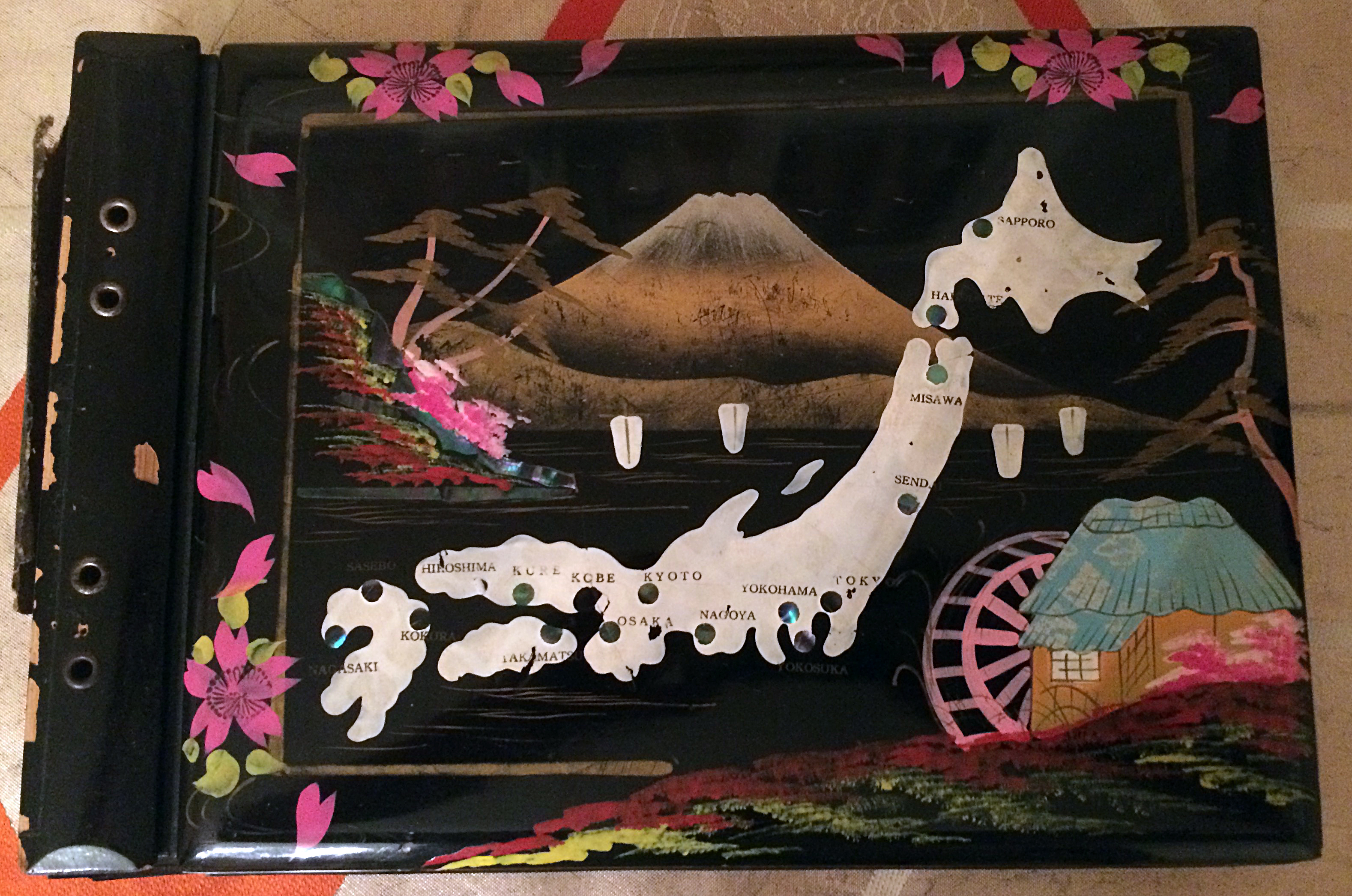 As a kid, I was fascinated by a gorgeous lacquered photo album Daddy bought during a trip to Tokyo for R&R. He filled it with pictures of himself and his buddies. He also preserved the many photos he took of barren landscapes, war-weary women, hungry children in ragged clothes, and even a stray dog that became the troop mascot. He talked a lot about the impoverished Koreans he encountered. Like all American soldiers, he gave them candy and other treats. Daddy was particularly fond of the houseboy Kim, and always wondered what became of him.
As a kid, I was fascinated by a gorgeous lacquered photo album Daddy bought during a trip to Tokyo for R&R. He filled it with pictures of himself and his buddies. He also preserved the many photos he took of barren landscapes, war-weary women, hungry children in ragged clothes, and even a stray dog that became the troop mascot. He talked a lot about the impoverished Koreans he encountered. Like all American soldiers, he gave them candy and other treats. Daddy was particularly fond of the houseboy Kim, and always wondered what became of him.
That lacquered album is one of my prized possessions. It’s so pretty that I have it displayed behind glass in my dining room. Its delicate spine is broken, which makes it all the more special to me. I handle it gingerly. And here’s what really gets to me: I can still smell the glue that Daddy used to affix the photos to the black paper – each page separated by a sheet of thin, marbled rice paper.
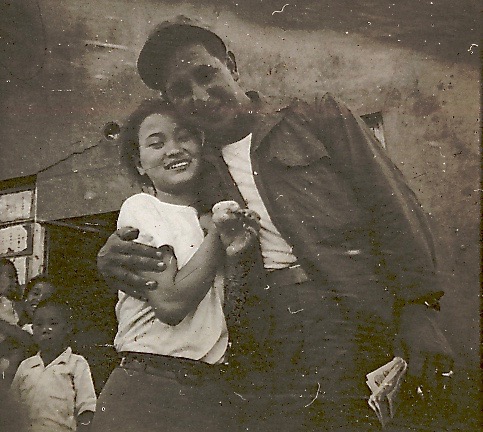 I had several opportunities to visit Korea in the 1990s. I took loads of photos so that I could show my dad how Seoul had grown into a world-class city. Over the years I visited all the museums, road the subways, fell in love with kimchi, bought lots of cheap leather goods in the famous Itaewon market, and even took a USO-sponsored trip to the DMZ in Panmunjom, where I stood at the border with one foot in the South and one foot in the North, gazing at the alien emptiness of the world’s most secretive country.
I had several opportunities to visit Korea in the 1990s. I took loads of photos so that I could show my dad how Seoul had grown into a world-class city. Over the years I visited all the museums, road the subways, fell in love with kimchi, bought lots of cheap leather goods in the famous Itaewon market, and even took a USO-sponsored trip to the DMZ in Panmunjom, where I stood at the border with one foot in the South and one foot in the North, gazing at the alien emptiness of the world’s most secretive country.
Once, in a park in Seoul, I heard a woman summon her pretty little girl by calling out, “Idi-wa.” I took pause, and remembered how I went running to Daddy when I heard those words.
My dad didn’t do anything really special during the war. He earned no medals or commendations. He kept the jeeps running, the laughs coming, and the liquor flowing. But, more importantly, he had a sharp eye for detail, vivid memories of the people he met, and a big heart full of compassion. And that’s heroic enough for me.
© Dana Spiardi, May 30, 2016
“What Did You Do in the War, Daddy” was the title of a silly 1966 film about a band of U.S. soldiers trying to convince the citizens of a small Sicilian village to surrender to the Germans during WWII. Director Blake Edwards came up with the title after his son posed that question. The film starred James Coburn and Dick Shawn.
]]>
On April 30, 1997, I was attending an evening AA meeting (yes, today I’m choosing to be brave and honest like Ellen, and make that fact public), and afterwards several of the members asked me to stick around for the usual post-meeting ritual of gabbing and grabbing the leftover donuts. “No, I need to get home to watch the Ellen show,” I exclaimed, and bolted out the door. The next week, Sarah Jane said, “You know, those guys last week…well, they were wondering about you.” “Why is that?” I asked. SJ explained: “Well, you seemed a little TOO interested in Ellen Degeneres. And you wear your hair REALLY short, so they think you’re a lesbian.” Hahaha. (Thank you, Judy Betten, my marvelous hairstylist of the past 25 years, for creating that special ‘do that makes ‘em wonder if I do or don’t!) That’s always been one of my favorite stories about small-minded people making assumptions. They should have been practicing tolerance and open-mindedness, along with their sobriety.
That said, I’ve long been inspired by the courage, struggles, and brutal self-honesty of so many famous women who have turned their lives around by seeking help and fearlessly sharing their recovery experiences: (Saint) Betty Ford, Liza Minelli, Bonnie Raitt, Marianne Faithfull, Carrie Fisher, Stevie Nicks, Christina Ricci, Oprah Winfrey, Elizabeth Taylor, Belinda Carlisle, rock-tour manager Chris O’Dell, anchorwoman Elizabeth Vargas, and many other fab, creative, wild dames I love. I may not possess one iota of their talent and will probably never achieve their level of accomplishment, but I’m proud to be part of their world of self-discovery. It’s a world I entered, kicking and screaming, 20 years ago this month, but I’ve never regretted it. And even though I still wake up many a morning with feelings of fear and longing and self-doubt and low self-esteem, at least I’m chemical-free and navigating without crutches.
So, there you have it. I’m actually celebrating THREE things today!
© Dana Spiardi, April 30, 2017
[The image in the banner is a photo I took a few years back at the Chicago Museum of Contemporary Art. It’s by artist Lorna Simpson. The title of the article is a lyric from Bob Dylan’s “Like a Rolling Stone.”]
]]>As a rocker steeped in the punk/New Wave music of the late 1970s, Patti’s Smith’s sad, solemn “Easter,” with its echo of bagpipes and bells, its chime-like vocals, immediately springs to mind.
I am the spring, the holy ground
The endless seed of mystery
The thorn, the veil, the face of grace
Brazen image, the thief of sleep
It’s a haunting, poetic, triumphant piece of work — one of the few modern songs infused with lyrics so literally inspired by the story of Christ’s ascension to heaven.
But today I found another song named “Easter” that I love nearly as much. This little gem from 2006 was produced by The Prize Fighter Inferno, a side project of Claudio Sanchez, leader of a band called Coheed and Cambria.
I don’t want to run around, run outside your kitchen
In the front yard, outside where the children play.
Sandbox drifting in the land outside you’re missing
Sail until Sunday just till the evening’s gray.
It’s Easter, into the sun, with Cecilia.
It’s Easter, the sun, and Cecilia.
I don’t want to lie against duck-tape cracked or crooked
In the out door, left outside in the rain.
Bus ride longing for the face that I’ve been missing
Seventeen looking for a day I long again.
It’s Easter, into the sun, with Cecilia.
At first listen you may wonder what this song has to do with the spiritual essence of Easter. But study the words. The singer is searching for something beyond the everyday dolor of her life. Maybe her redemption lies in Easter, the sun, and a woman named…Cecilia?
Personally, I want to think the artist is honoring St. Cecilia, the patron saint of music. Born in either the 2nd or 3rd century A.D., she is said to have heard heavenly music inside her heart when she was forced to marry the pagan Valerian.
I hear words and music inside my heart and head every waking moment. Is it always heavenly? Maybe not to some ears. Be it soft and sprightly or thunderous and discordant, it has the power to change wistful to wondrous, raise fire from a spark, and turn morbid depression into delicious melancholy. (There are those among you who will understand that last one.)
But today is about rebirth! So commence with life. As Bob Dylan once sang, “He not busy being born is busy dying.”
Today yer blogger is going to obey St. Bob, as she always does.
© Dana Spiardi, March 27, 2016
The painting in the banner is by Marc Chagall, 1968.